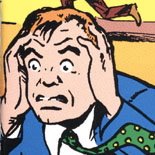Psycho-Changer, Qu'est Que C'est

One of the greatest advantages of long form, episodic storytelling is that characters develop over time as a natural reaction to their experiences. Rather than the sudden epiphany required in a two hour movie, a comic book character can, issue by issue, over years, progress through stages of growth.
Catwoman, for example, moved from thief with little conscience to someone who robs only from the rich to Robin Hood in black leather to out-and-out vigilante superhero—not over the course of one story but over two series running over 15 years! Such a well mapped progression gives a sense of character growth earned, an arc rewarded and a hero in the place she ought to be!
Which is why I really hate "psycho-changers," those plot devices that explain personality change as the sudden result of some external influence. Instead of personality changing as a natural reaction to personal experience, characters are bonked on the head with a coconut or exposed to "evil radiation" and suddenly they're jerks, murderous and wearing stupid emo haircuts. (Why yes, I did see Spider-Man 3 this weekend. Why do you ask?)
One of the many reasons I stopped watching Smallville was that the only times the characters changed at all was when they were hit with Kryptonite-infused pollen (or Kryptonite-infused bugs, or red Kryptonite, or black Kryptonite, or...) and suddenly they were adrenaline-seeking bad girls who dressed skankily or wanted to kill Clark. Why should the writers take the time to come up with a good, compelling reason teenagers would want to have sex or Lex Luthor would want to be evil, when there's Plotdevise-inite just lying around everywhere? I mean, "psycho-changers" are okay for one-shot stories where they set-up otherwise impossible situations ("Oh no, Superman thinks he's Darkseid's son!") or are used as metaphors for internal struggles (one of fantasy's great strengths is that internal demons become external, where they are easier to punch in the nose). But when they are over-used or are used in place of real development, where the metaphor is dropped entirely, they become a major problem.
I mean, "psycho-changers" are okay for one-shot stories where they set-up otherwise impossible situations ("Oh no, Superman thinks he's Darkseid's son!") or are used as metaphors for internal struggles (one of fantasy's great strengths is that internal demons become external, where they are easier to punch in the nose). But when they are over-used or are used in place of real development, where the metaphor is dropped entirely, they become a major problem.
Particularly when the "psycho-changer" actually REPLACES real development (that some other writer took the time to create) with arbitrary excuses for new behavior. God forbid the loss of his entire city and almost everyone he knows drove Hal Jordan to try change history, no matter what the cost. That would, you know, make sense. Nope, he had to be infected with an alien parasite no one knew about before. (Also, all the people he killed are not actually dead.)
Or Cassandra Cain. Daughter of assassins. Trained from birth to be an assassin. Used by Batman more as a weapon than as a person. Never discovered her human side, no matter how hard she tried. Forced to fight her mother, over and over again, until she finally kills her. Disappears for a year. But what explains her trying to kill Robin? 
Evil Serum!
But more annoying to me than the "psycho-changers" explaining why good characters went bad are the "psycho-changers" that explain why villains reformed. I watched Catwoman grow a conscience over a very long period of time. To say that her growth was not her own, but imposed on her by a meddling Zatanna, is to say that Catwoman couldn't have changed on her own.
The problem is that "psycho-changers" define personality as something constant and inert unless arbitrarily acted upon by fantastic forces. That rehabilitation is just as impossible as falls from grace. That some people are just born evil, and some are born good, and nothing short of alien intervention can change that.
In fact, personality is something that's constantly in flux. Are you the same person you were five years ago? Have you grown in anyway? Are you better? Are you worse? And is any of this change a result of brainwashing?


